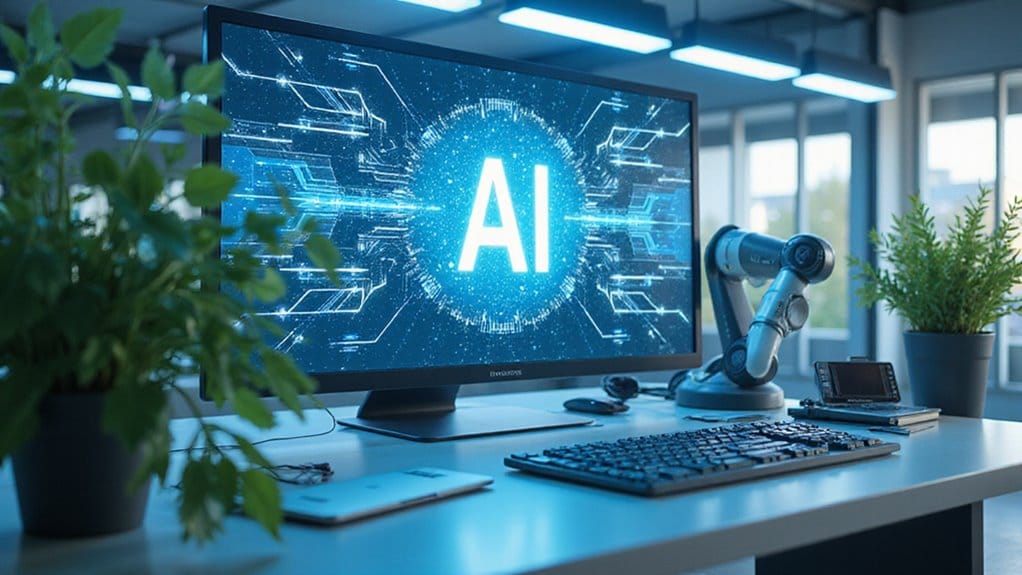To kick-start a career in artificial intelligence, first, get comfy with tech basics: think machine learning and deep learning. Math? You’ll need calculus and statistics. Cozy up to Python, it’s your best buddy in coding. An online course or a solid degree in computer science is a must, but don’t just sit there! Grab internships or jump on projects to flex your skills. Seriously, the AI field is booming, so stay sharp and curious—there’s much more to discover!

Starting a career in artificial intelligence can feel like stepping into a thrilling, yet intimidating, new world. So, where do you begin? First off, you need to build your foundational skills. Think of these as your AI toolkit. You’ll want a solid grasp of AI basics like machine learning, deep learning, and natural language processing. Trust me, these concepts are the bread and butter of AI.
Next up, let’s talk math. Yes, you heard that right—math! Calculus, linear algebra, statistics, and probability are vital for understanding how AI works. If numbers make you cringe, you might want to reconsider your career choice.
And don’t forget programming skills; Python is your best friend here. Learn it, love it, and maybe even dream in it. Other languages like C/C++ can be handy, too.
Now, let’s explore education and training. Most AI professionals hold at least a bachelor’s degree in computer science or mathematics. But wait! Certifications and online courses can also enhance your skills. Platforms like Coursera and edX have a treasure trove of resources. The more you learn, the better your chances of maneuvering through various AI career paths—like becoming an AI research scientist or a machine learning engineer. Additionally, understanding the competencies needed for advancement can significantly boost your growth in the field. Remember, the demand for skilled AI professionals is increasing, making your education and training crucial.
Practical experience is essential! Internships are a golden ticket. They provide hands-on experience and expose you to the latest AI technologies. Engage in projects, volunteer for open-source initiatives, or even work on personal projects. Show the world what you’ve got!
Finally, never stop learning. AI is a fast-moving field, and if you snooze, you’ll lose. Stay updated on the latest trends and innovations. Remember, an AI career is not just about technical skills; it’s also about problem-solving and collaboration.
Frequently Asked Questions
What Programming Languages Are Essential for AI Careers?
For anyone eyeing a career in AI, mastering essential programming languages is fundamental.
Start with Python—it’s the go-to language, thanks to its libraries like TensorFlow.
Don’t overlook R programming for data analysis, or Java applications for enterprise-level needs.
C++ offers high performance, perfect for demanding tasks, while Julia shines in numerical computations.
And hey, SQL integration? It’s essential for managing databases.
How Important Is a Degree for Entering the AI Field?
A degree can be vital for entering the AI field, but it’s not the only game in town.
Sure, formal education provides a solid skills foundation. However, degree alternatives like online courses and self-learning can also pave your way.
Emphasize mastering programming and data analysis—those skills are essential!
Just remember, without a degree, you might need to hustle harder for senior roles.
What Are the Best Online Courses for AI Beginners?
For anyone diving into AI, online certifications are essential. Start with “Introduction to Artificial Intelligence” by IBM on Coursera—it’s a solid foundation.
Then, don’t overlook “AI for Everyone” by DeepLearning.AI; it’s perfect for non-techies.
Want to impress? Try “Machine Learning with Python” from Harvard.
How Do I Build a Portfolio for AI Job Applications?
To build a standout portfolio for AI job applications, start by selecting diverse portfolio projects that showcase skills like machine learning and data management.
Don’t just slap together random stuff; include projects from various industries.
Make it visually appealing—no one wants to sift through a cluttered mess. Document everything clearly, and keep it updated.
What Are Common Misconceptions About Working in AI?
Common AI job myths abound, misleading many enthusiastic minds.
First, programming is essential, but only one piece of the puzzle. Communication skills? Vital!
Don’t forget about low-code tools—yes, you can dabble in AI without a PhD.
Remember, AI augments jobs, it doesn’t obliterate them.
So, embrace new roles like AI ethics consultant.
Stay curious, keep learning, and build that portfolio.
Ignore the misconceptions, or you might miss out on your dream career!









